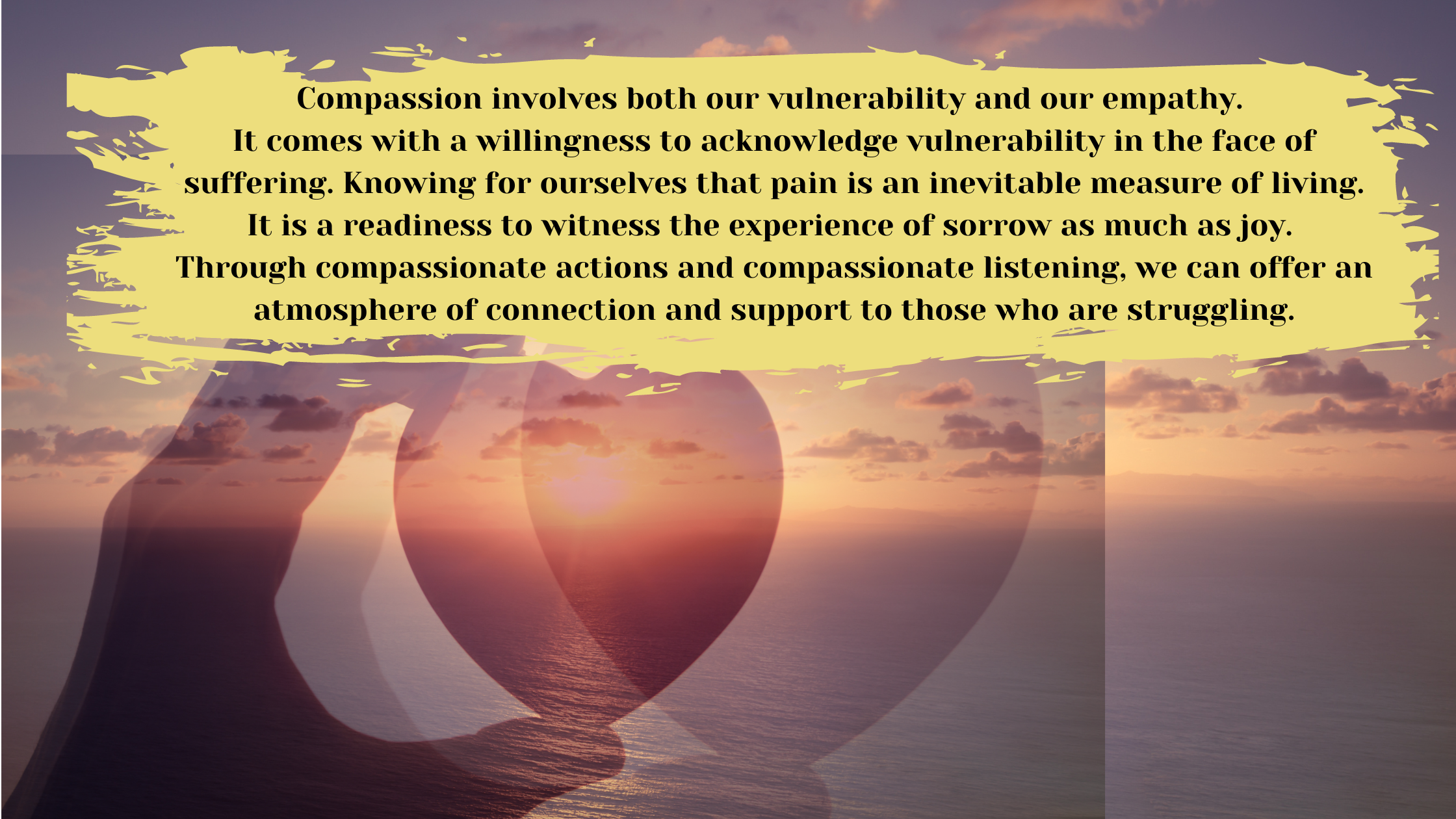Cultivating a Culture of Belonging: Vulnerability, Empathy, and Compassion.
Cultivating a Culture of Belonging:
Vulnerability, Empathy, and Compassion.
Over the last few weeks, I've been grappling with the concept of “loneliness as an epidemic." Mental health and mind-body connection have always been the cornerstones of my teaching since I started over 20 years ago. It's my passion as a yoga teacher more than anything else, more than helping back pain or strengthening the core. My most relevant role is to guide others in regulating their nervous system and embracing moments for sacred pause. Once we move past the misconception that yoga is solely about exercise and acrobatics, we uncover profound layers of introspection and self-inquiry. It’s a gradual and profound process of peeling back the layers. Then the heart of yoga reveals the source of healing is through relationships — with spirit, ourselves, each other, and everything in between.
We are called to a social sadhana. An ego-transcending practice of reconnecting to our collective humanity. In this hyperactive culture, we live saturated by opinion over fact, story over truth, and distraction over clarity. We are under the influence of a cult of personality. Transcending our ego requires standing with our own pain to cultivate empathy. It entails learning to be consciously present for our own stories, behaviors, and patterns allowing us to access compassion. And asks for full vulnerability— the courage to share who we are with nothing to hide, deny, or perfect.
All without letting our own perception mask or distort any version of someone else’s truth. Sound challenging? It is perhaps our life’s work. It’s a tightly bound braid of vulnerability, empathy, and compassion that brings us from isolation to unity, disconnection to cohesion.
Potent vulnerability releases us all.
We’ve started to redefine the misconception that vulnerability is a weakness. Instead, we now understand that it requires immense courage to be with our raw emotions. Even in search of ourselves, we go beyond dark shadows into an acceptance of all the complicated layers of who we are. We choose to step out from behind the façade and relinquish the need to hide things we deem better left unseen. In vulnerability we feel exposed, yet we know we possess the capacity to hold that space. We become an example of the inherent strength that is derived from living with and through honest humanity.
Vulnerability is the preface to empathy.
Since we have let ourselves go into places of discomfort, we recognize it in others. We understand suffering because we have felt it ourselves. We know the depth of an emotional hurt. Even if we have not directly encountered the same source of pain, we comprehend the essence of struggle. Empathy does not mean taking on the feelings for someone else. It means because we have been in spaces of fragile vulnerability, we share a genuine understanding. In empathy, we are present without the burden of our own baggage or story. Because we have bravely let our own pain surface in difficult times, we can hold a safe space for someone else to do the same.
Compassion is an active presence.
Compassion involves both our vulnerability and our empathy. It comes with a willingness to acknowledge vulnerability in the face of suffering. Knowing for ourselves that pain is an inevitable measure of living. It is a readiness to witness the experience of sorrow as much as joy. Through compassionate actions and compassionate listening, we can offer an atmosphere of connection and support to those who are struggling. With deep empathy, we listen to another's pain without imposing our own perspectives, through advice or opinion. Listening while not inserting. Simply existing in a space of open acceptance and equanimity.
As we bring Mental Health Awareness month to a close, the work is just beginning. The consequences of years spent in isolation have become apparent, crippling our economy and leaving our society in a state of polarization. Surgeon General, Dr. Murthy issued a powerful call to action, urging us to come together and engage with our mental health crisis. His vision encompasses six pillars that aim to strengthen social infrastructure and foster a sense of belonging within communities. We need to transform our cultural and governmental policy to build and repair our social connections. This responsibility extends to researchers, tech giants, the medical community, as well as individuals, parents, and educators. In this pivotal era, we find ourselves in a state of deconstruction, where we must dismantle the systems and structures that weaken us as a people. Change is always met with chaos and resistance as everything recalibrates to a new frequency. Yet, we all need to examine how and what we contribute to both the cause and the cure.
As individuals, we have the power to choose how we shape our progress and define what it means to move forward. Although it may seem obvious to state that stress can be detrimental and loneliness can be a disease, it is through understanding how the cycles of isolation manifest in our own lives and those of our loved ones that we can dismantle the stigma surrounding loneliness. We can address our own self-preservation mechanisms and acquire skills to regulate our nervous systems. If we see that as much as relationships can be the source of our wounds, they can be the source of our healing. As we get stronger in our powers of vulnerability, empathy, and compassion, we take a step in cultivating a culture of belonging.



